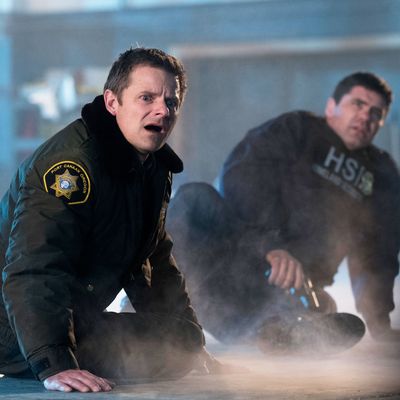
Given TV’s current love affair with reincarnating old shows, it’s surprising that Lost hasn’t gotten a reboot yet. In a way, though, it has, thanks to The Crossing, a new mystery-thriller that ABC is promoting in commercials that note the series comes “from the network that brought you Lost.”
It’s obvious why Disney’s flagship channel is making that connection almost immediately in the pilot, the only episode provided in advance. The story begins with survivors and non-survivors of what appears to be a shipwreck washing up on the shores of a beach off the coast of Port Canaan, Oregon. While this disoriented group is not alone on an island, their circumstances make them suspicious of the police officers and Homeland Security agents, including Emma Wren, played by Sandrine Holt (House of Cards), investigating how and why they suddenly appeared out of nowhere in the choppy waters. That suspicion runs both ways.
When the youngest of the living, 8-year-old Leah (Bailey Skodje), tells the local sheriff Jude Ellis (Steve Zahn, playing it super straight) that she and her mother were fleeing the war, but also says she is from the United States, he’s perplexed. There’s no war in America, he tells her. Then a fellow survivor, Caleb (Marcuis W. Harris), chimes in: “What she’s talking about, these things that we’ve experienced? They haven’t happened yet.” So yeah: There’s time travel involved. Which, again, is pretty Lost-y, as is the government conspiracy element that begins to develop by the end of the first hour.
The primary job of a TV pilot is to intrigue viewers, and The Crossing accomplishes that. Its premise, from creators Dan Dworkin and Jay Beattie, who collaborated on the El Rey series Matador and previously wrote for Revenge, is compelling and comes with a pretty meaty, relevant subtext: how would Americans treat refugees that claim to be their fellow citizens? As he tries to calm his fellow journeymen and women who have trouble adjusting to their new environment in the past, Caleb tells them: “This is the America of old. Everyone has rights here no matter where they’re from.” It’s a line that, at this particular moment, is hard not to greet with a smirk. The Crossing makes a point of noting that it takes place in early 21st-century America, but it doesn’t say how early. Is George W. Bush, Obama, or Trump president at this point, or is some other fictional figure acting as Commander in Chief? In the first episode, the show doesn’t tell us. But at least at this stage, it seems less interested in functioning as a work of topical social commentary and more committed to spinning an absorbing, escapist yarn.
It’s also difficult to determine whether this show will be something truly ambitious and must-watch in the same way that Lost was, or yet another forgettable broadcast-network-ized attempt at serialized suspense. The first episode suggests it could go either way. When smart camerawork reveals Ellis’s discovery of a body on the shore, then slowly widens to reveal more bodies on the sand and, eventually, many, many more bobbing out on the waves, The Crossing tips toward the former category. Unlike Lost, the Pacific Northwest atmospherics are more evocative of The Killing or Twin Peaks, which also low-key announces that this series has an air of prestige about it. But the initial hour’s insistence on rushing from revelation to revelation makes me wonder whether it has enough juice to sustain momentum for an entire season.
There are some overly familiar elements that bubble up at times as well, including Ellis’s role as the lonely cop who’s divorced from his wife (shades of The Leftovers there) and the inevitable conflict between Ellis, the local, and Wren, a fed who is trying to keep a lid on the fact that there may be time travelers in their midst. “You know something you’re not telling me,” Ellis tells Wren during one of their tug-of-war-style conversations. This is the kind of show where you know someone’s going to say that at some point in every single episode.
What The Crossing isn’t telling us in its pilot is whether it’s fully worth committing to for multiple episodes. I’m willing to give it a shot for at least two or three more, at which point we’ll hopefully have more answers and not just a pile of additional questions scientifically designed to make us tune in next week.





